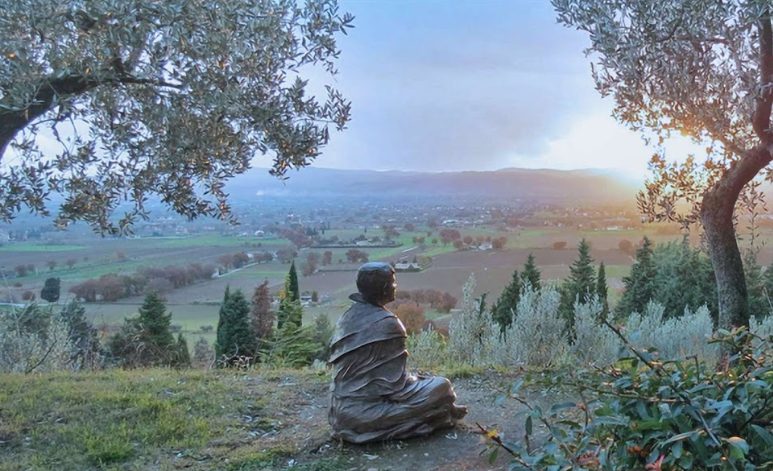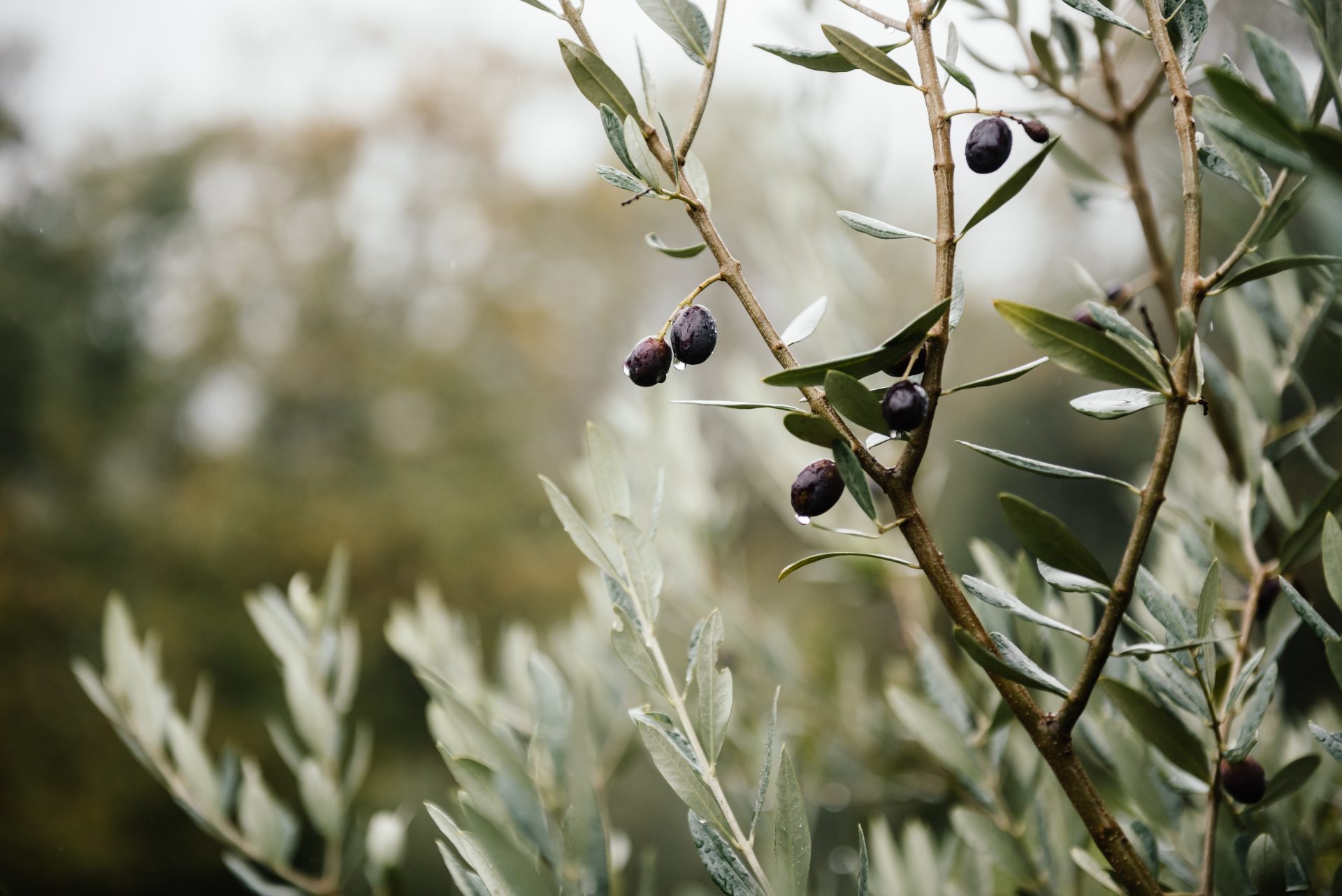
Thursday 6th April
HOLY THURSDAY – YEAR A
Matthew 26, 36-46
Today, in the liturgy of the Easter triduum we reach the culmination of the history of salvation. With the Easter Triduum we will also conclude this deepening of our understanding of the Gospel, read with the gaze suggested by the Laudato Si’ of Saint Francis and by the Laudato Si’ of Pope Francis, both in connection with creation. We invite you to slow down, take the time to delve into and pray about these verses of the Word. For this reason, the reading of Matthew’s passages from these solemn days will be focused on where these facts occured, immersed in creation. An olive grove, a mountain and a garden. This evening we find ourselves in the Garden of Gethsemane, in the company of the olive trees at the hour of prayer, of abandonment, of Jesus’ agony.
Gethsemane, in Hebrew “gat šemanîm” means “oil mill” or “olive-press”. The press in the Jewish tradition recalls God’s vengeance, for example when the prophet Isaiah says: “Into the vat I pressed alone and of my people none was with me. I crushed them in anger, I trampled them in anger” (Is 63:3). Today in this oil mill through the experience of Jesus, we understand better what God’s vengeance is. Matthew’s narration describes to us a man profoundly detached from others, who suffers, who prays, who feels sadness and anguish, a ‘pained’ Christ who, thanks to Franciscan culture, helped us, centuries later, to emerge from the “glorious” image of the cross, almost as if God had not even suffered the passion, knowing that he would rise again. Instead Matthew, and then the art and culture that developed from the thirteenth century, are also keen to tell us about the agony, the suffering and the tears of God in the face of difficulty.
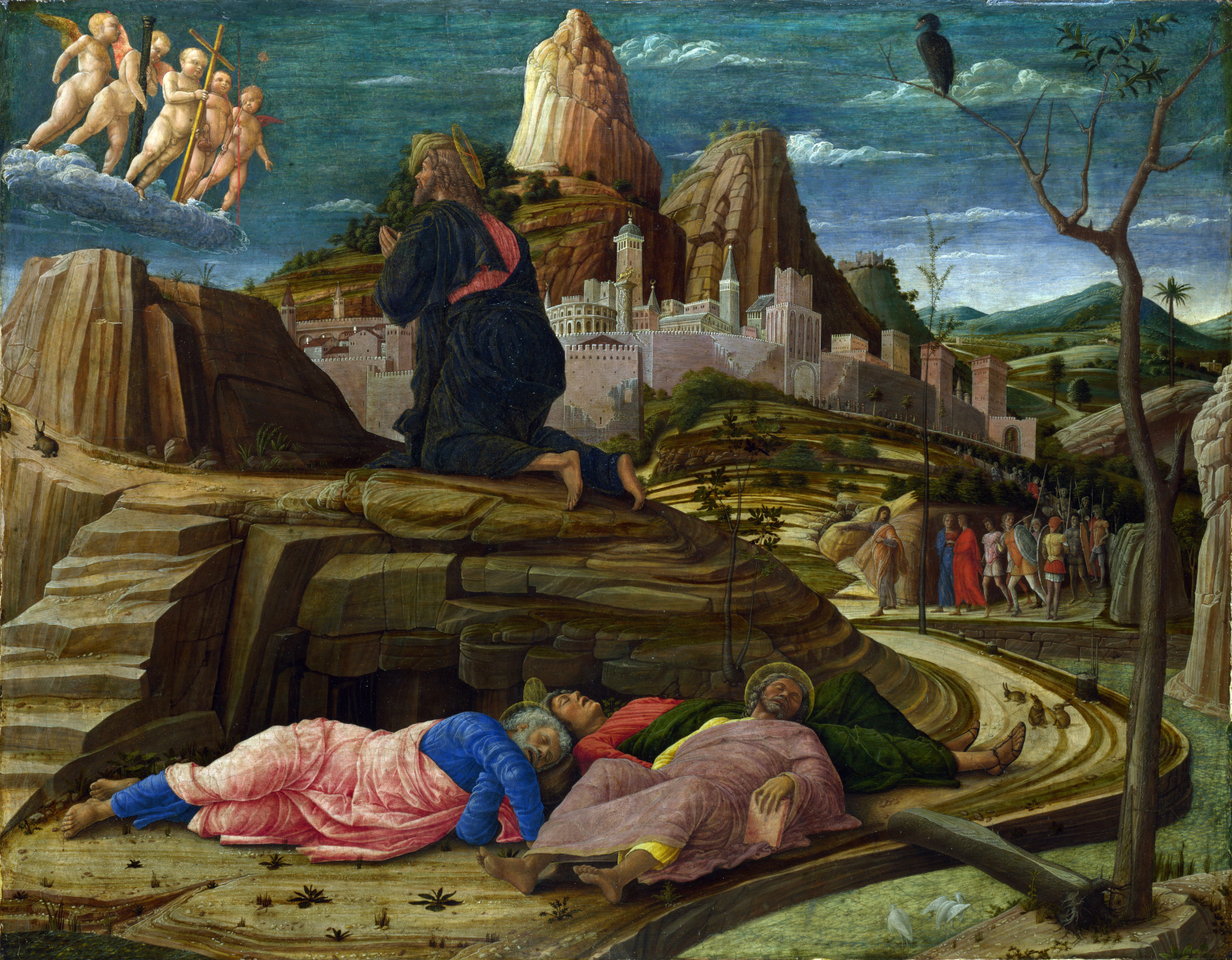
(The Agony in the Garden, Andrea Mantegna, 1455, National Gallery, London).
Here return many themes that we have already seen along the journey of Lent a few weeks ago, in the scene of the Transfiguration: the Father-Son dialogue, the search for the face, the company of the three apostles who do not understand what they have before them. Here, almost in contrast with the light of Mount Tabor, darkness descends on this mountain, it is night, and Luke’s narration tells of that night hour by hour of the capture, of the judgment, of the ordeal, of solitude and of the eclipse at noon spreading darkness throughout the earth. A night that lasts all day bringing disappointment and silence. It is the night of the old creation which precedes the dawn of a new day. Just as it happened in the first creation…… there was darkness and with a word He created light. But today, after the feast in the Upper Room (Cenacle), a little drunk and a little shocked, at the beginning of this very long night, we enter the enclosure of the mill in the olive grove.
“Then Jesus went with his disciples to a place called Gethsemane,”. Jesus comes out of the cenacle, comes out of a house made of walls, and from this moment on he will pass through palaces and places of torture, into open courtyards, along the streets, up to a mountain. From that moment he will live completely outside, immersed in creation and in the cry generated by human justice. A place of habits, every evening this week Jesus retired in prayer precisely “in this place”, in this temple. And in fact Jesus asks his friends: “Keep watch with me”, he asks them almost as a supplication. He asks it of us tonight, within the cry that we live every day. We must learn to pray and to ask God not for what we want but for what is good. Pray for what?
“Pray to not fall into temptation.” Temptations are what we saw at the beginning of Lent in the desert, all temptations: bread, power, God with a magic wand, in a nutshell the temptation to be “me at the center”, to possess all things, relationships with others, the planet. There are also the temptations we have seen while living this Laudato Si’ Lent: individualism, comfort, consumerism and many other ways in which we have disconnected from creation and from our brothers and sisters. Prayer is fundamental in our process of ecological conversion. It is not just a nice habit or something that is done because the parish or diocese tells us, but it is the basis for not falling into temptation. Jesus enters the garden, but asks not to fall into temptation.
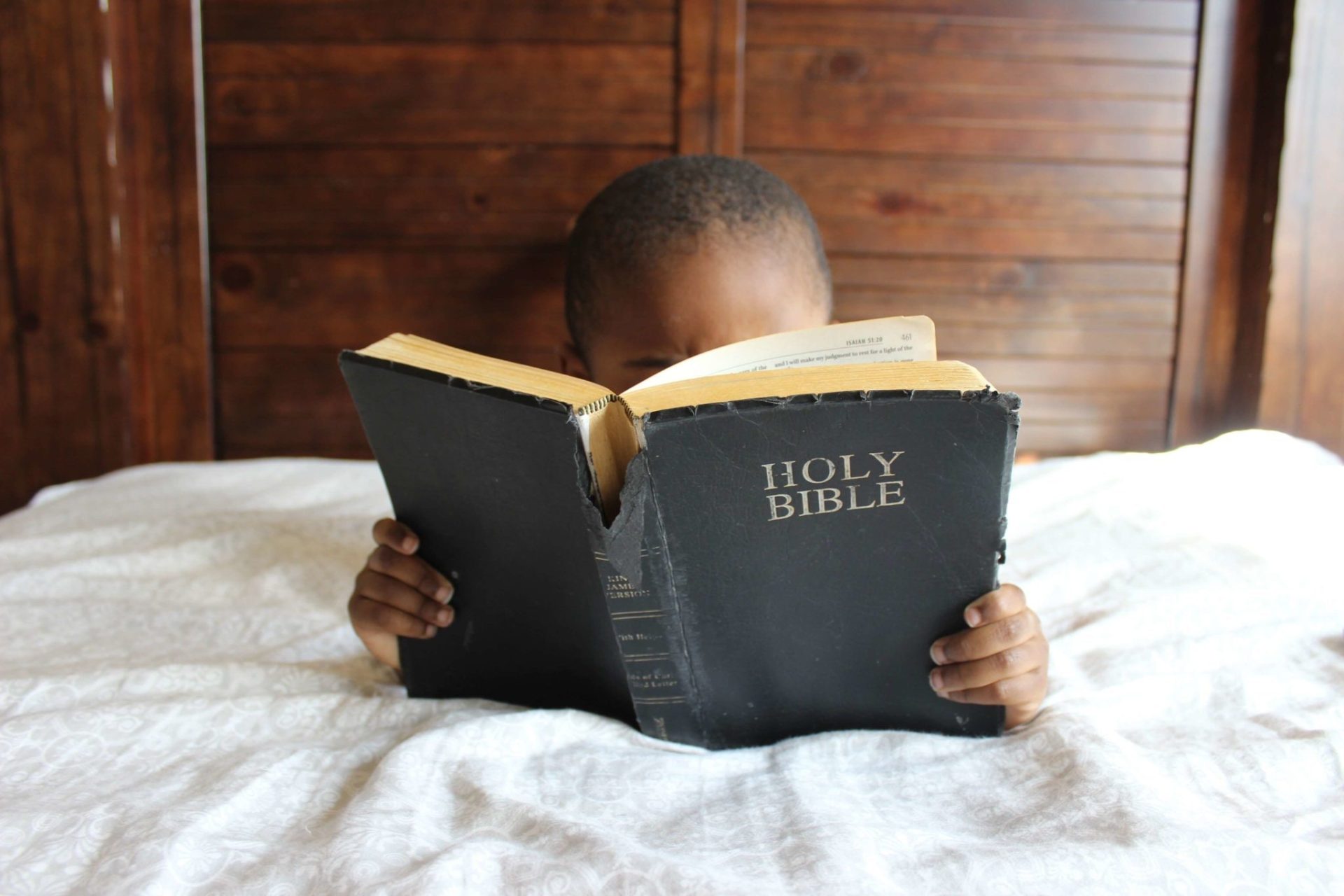
“Going a little farther, he fell with his face to the ground and prayed”, referring to the terror and anguish that led him to live a prayer of total contact with the earth. A cosmic prayer, in contact with mother Earth, in which Jesus calls God “Abbà”, or “Dad”, a word that reminds us of the creative word, a new creation, starting from the darkness and evil of the world. First of all, Jesus distances himself from evil, asks the Father: “ Father, if it is possible, may this cup be taken from me”, That is, the cup of suffering that is wanted by men. God does not want evil, it is men who build crosses, inflict suffering on their brothers and on creation. God suffers this evil, and if he could choose he would prefer this cup to be far from himself. But he also flees the temptation of a God with a magic wand, temptation of power and immunity, praying: “Yet not as I will, but as you will.” The root of all evil in the world lies in the exclusion of God when we put our ego at the center. “My” will that excludes the will of God, the will of good. Jesus has his gaze centered, as Francis understood with the vow of “nothing of his own.” It is not enough to be poor, but in life, one must aspire to retain nothing of one’s own possession, because possession is the opposite of love. In Gethsemane, this becomes incredibly clear.
This great teaching of Jesus demonstrates the highest point of his humanity. It was not only God who knew he would be resurrected, but here was a man who felt torn in his relationship with his father, experiencing an immense injustice. In our injustices, in our prayers, we know we have Jesus by our side, but he, on the other hand, was terribly alone.
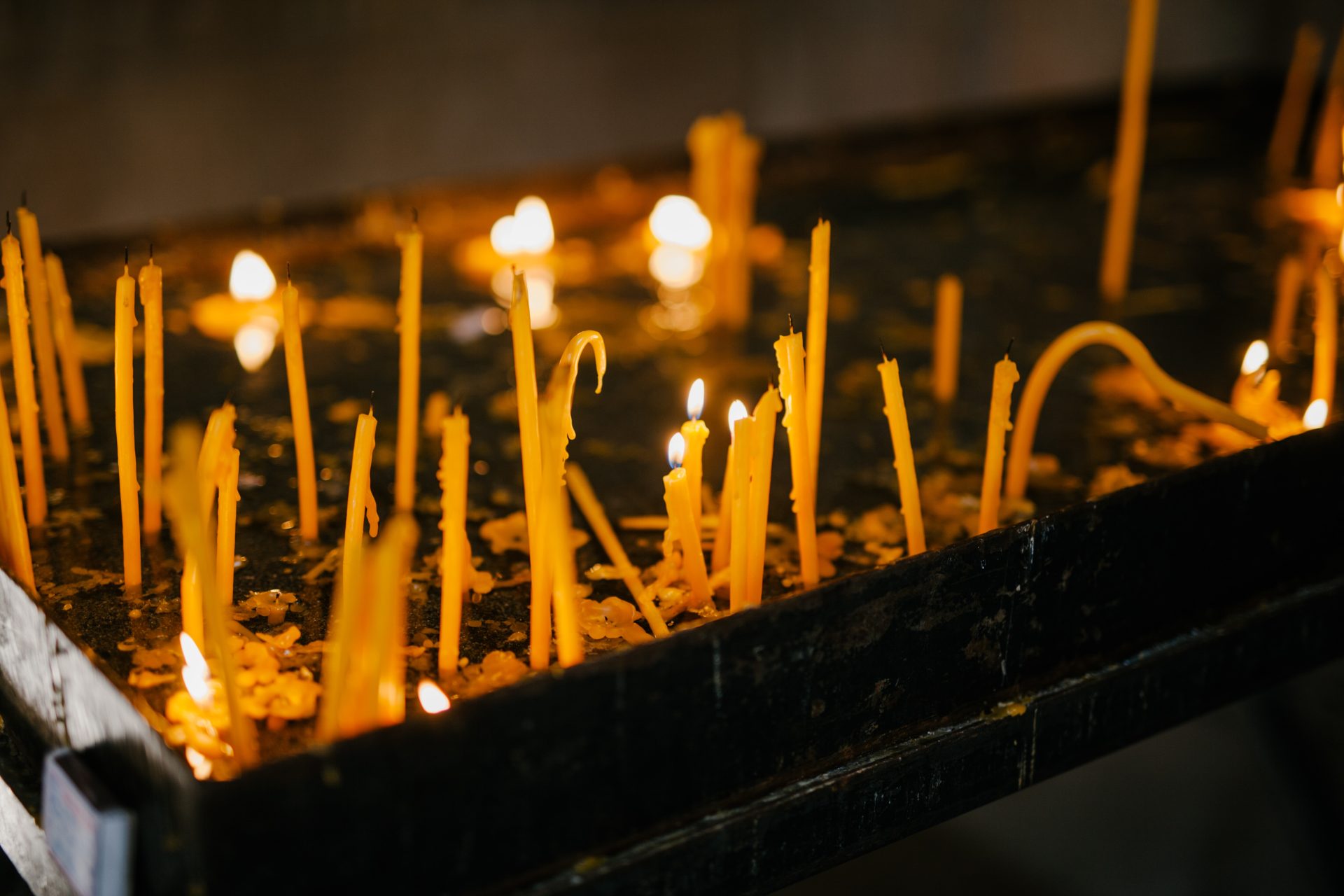
“When he came back, he again found them sleeping, because their eyes were heavy”. Sadness and agony prevent us from seeing grace, from keeping our eyes open. How many heavy eyes there are in this humanity of ours!! “Rise! Let us go! Here comes my betrayer!” Get up and pray. Get up and go. That’s what to do in the face of evil, even the most unjustifiable evil. This is the greatest teaching that we receive, on this night, among the olive trees at the oil mill in Jerusalem.
St. Francis, in the stupendous paraphrase to Our Father, reminds us that: “Thy will be done, on earth as it is in heaven: so that we love you with all our hearts, always thinking of you; with all my soul, always desiring you; with all my mind, directing all our intentions to you and in everything seeking your honor; and with all our strength, spending all our energy and sensitivity of soul and body in the service of your love and for nothing else; and so that we can love our neighbors as ourselves, dragging everyone with all our power to your love, enjoying the goods of others as our own and suffering together with them and causing no offense to anyone “(FF 270). We thank the Lord for this great teaching that he offers us in this night of silence and solitude. Let us pray on this night, also dedicating silence, so that we can learn from him how to live in the injustices and evil of the world.
Laudato si’!
